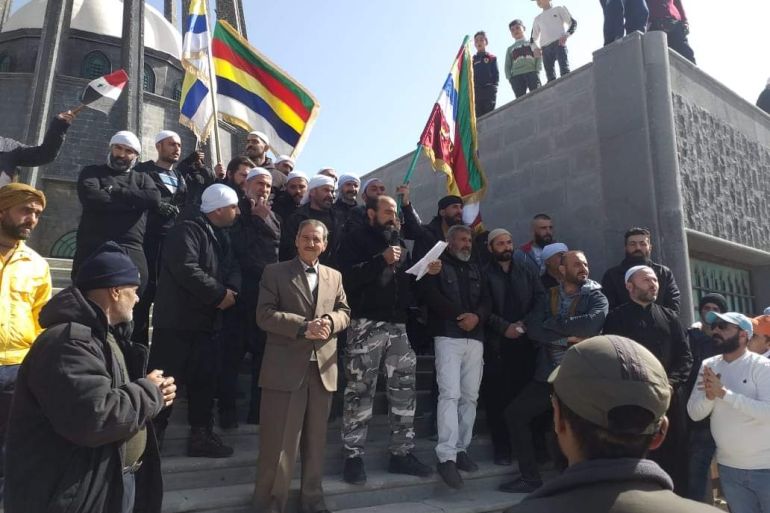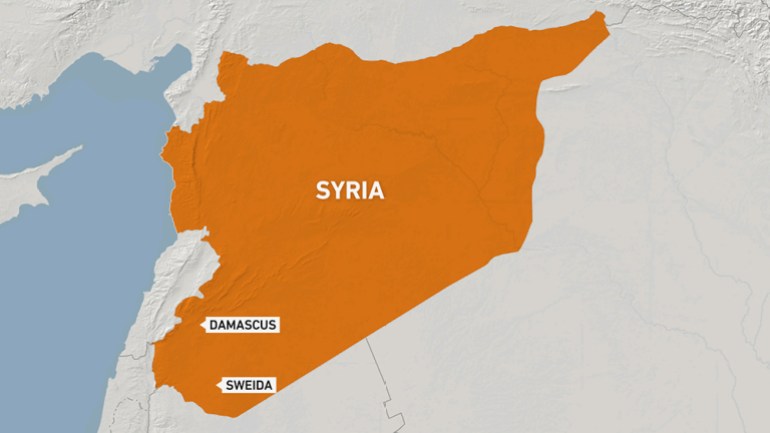‘Economic blockade’: Syrian city punished for anti-govt protests
Druze-majority Sweida has stayed relatively neutral in Syria’s war, but recent protests have led to punishments.

Anti-government protests are no longer common in areas of Syria under the control of President Bashar al-Assad.
Protesters who took to the streets against him in the uprising that began in 2011 are now either cowed into silence, displaced, exiled, imprisoned, or worse.
Keep reading
list of 3 itemsSyria: Israeli missile attack near Damascus
Ramadan 2022: Syrian refugees struggle in cash-strapped Lebanon
Yet, in the Druze-majority city of Sweida, in the south of the country, near the Jordanian border, protests last February indicated growing anger in Syria at corruption and worsening living conditions.
The Syrian government’s decision to stop subsidies for bread, diesel, cooking gas, petrol, and other essential items, for hundreds of thousands of people, triggered outrage.
Coupled with the continued collapse of the Syrian pound, and skyrocketing inflation, it was enough to convince thousands of people in Sweida to take to the streets and risk the same kind of repression that was meted out to Syrian protesters in 2011.
The difference has been, this time, that it was Sweida that rose up in anger, while other areas remained quiet.
As Druze, the majority of Sweida’s residents are from a minority religious sect, and since 2011, most of them have taken a relatively neutral stance towards the country’s uprising-turned-war.
The Druze in Sweida appear to be more willing to protest now.
“In the earlier years of the crisis, we were put in a difficult spot between wanting change and preserving our area,” Hadi Abu al-Joud, a Druze student activist, told Al Jazeera.
Abu al-Joud explained that many people in Sweida were initially sympathetic to the opposition, but concerned about various wings of the armed opposition that had targeted Druze people.

A struggling economy
Years of war, the coronavirus pandemic and sanctions continue to batter Syria’s economy. According to the United Nations, 90 percent of the country lives in poverty, while 60 percent are at risk of going hungry.
With the Syrian economy deeper in the mire, al-Assad’s government continues to slash its budget, falling from about $9bn in 2020 to $5.3bn for 2022.
Swiss-Syrian professor at the European University Institute in Florence, Joseph Daher, said that crumbling infrastructure would continue to exacerbate tough living conditions in Sweida, with electricity cuts, damaged sanitation infrastructure, and a lack of spare parts causing water shortages.
“It’s not only because of the sanctions [on the Syrian government],” Daher told Al Jazeera. “But it’s also because businesses selling those parts involve regime officials and businessmen close to the regime.”
The Syrian government has imposed what Abu al-Joud called an “economic blockade” on Sweida as a punishment for the protests, worsening inflation and making it more challenging for families to secure even the most basic groceries.
“The prices of groceries and basic goods keep on increasing,” Abu al-Joud explained. “The price of a kilogram of tomatoes can sometimes reach 5,000 Syrian pounds ($2), while it’s cheaper in other parts of the country.”
Corruption in government offices in the province has also skyrocketed, according to Abu al-Joud. “People waited for weeks to get passports in the immigration building,” he said. “It’s so corrupt that they won’t give you anything unless you bribe them.”
The Syrian government has not issued statements about the protests in Sweida. However, Bouthaina Shaaban, a senior adviser to al-Assad, has previously called for calm and claimed that the protests could be exploited by Western states to further ruin Syria.
Government officials have primarily blamed US sanctions on the war-torn country for its economic woes, as it has continued to raise the prices of subsidised goods like bread and fuel.
The Syrian government did not respond to Al Jazeera’s inquiries about the protests in Sweida and the country’s economic crisis.
Samia, who asked to use a pseudonym for security reasons, was born and raised in Sweida. She said that while the economy has never thrived, it has also never been this bad.
“We had economic issues before, but now things are out of control, really out of control,” she told Al Jazeera.
The university student, who lives between her hometown and Damascus, said the past winter had been unforgiving, as living conditions spiralled. “We only had about eight hours of electricity every day,” she explained. “My family spent most of the winter without heating.”
Instead, Samia said that they had used blankets to keep warm, and kept their masonry heater, called a “sobia” locally, off, as fuel and firewood prices were too high this winter.
Safety has become another issue. Samia no longer enjoys walks outside, especially at night. “It’s not really safe like it was before. People are stealing and murdering each other, and justify it by the fact that they are going hungry.”
Limited Autonomy
Sheikh Sleiman Abd al-Baqi, an outspoken Druze religious leader in Sweida who has taken part in anti-government protests, said al-Assad and his government have ruled with “an iron fist” to quell any dissent.
But he was also wary of fighting plaguing the southwestern city.
“We need [UNSC Resolution] 2254 and support from other countries to solve this problem,” Sheikh al-Baqi said. “We don’t want to see more blood spilled in the country.”
Seven years ago, the UN Security Council, including Syria’s allies Russia and China, voted in favour of resolution 2254, which called for the rewriting of the Syrian constitution, a political settlement between the parties to the conflict, and an eventual transfer of power through elections. However, nothing has materialised.
Syria’s uprising-turned-war began in 2011 with a brutal crackdown on anti-government protests. It later turned into a complex conflict involving foreign armies, local militias and foreign fighters, killed hundreds of thousands of people, and forced millions from their homes.
Unlike other cities in Syria, Sweida was able to remain fairly isolated from the conflict, and residents refused to serve in the army outside of their province. The Syrian government reluctantly complied, which Daher said had deepened a form of “limited autonomy”.
“It’s not like the northeastern part of Syria at all [under Kurdish-led Syrian Democratic Forces],” Daher, author of, Syria After the Uprisings: The Political Economy of State Resilience, explained. “State institutions exist in Sweida, and roads between Damascus and Sweida are mostly open, but there is space for some protest.”
Daher believed that the regime was able to “tolerate this setback” because the Druze community is largely sceptical of the formal opposition. “They don’t want to launch a new war,” he said.
However, the Druze community still felt the devastation of the war. In July 2018, an ISIL (ISIS) attack killed more than 250 people, and the community was also targeted by the al-Qaeda affiliated al-Nusra Front.
Activists told Al Jazeera that the Syrian government has tried to keep Druze families from protesting by telling them that political change could make them vulnerable to armed groups again. “We fought against the extremists, but we also won’t allow the regime to use the extremists against us,” Abou al-Joud said.
The government has also tried other methods: Activists, media workers, and protesters have been arrested, including the prominent activist Mazen Badrieh, who was taken away from his home by security agents in late March.
Like most Syrians, young people in Sweida are leaving in droves to find work. Samia, however, was conflicted.
“If we all left and no one stayed, how will things ever change? I think this is a responsibility the new generation has to take on,” she said.
“But at the same time, I could be selfish and just leave, because I don’t think there is any hope for change, at least not anytime soon.”